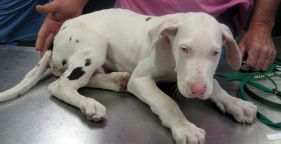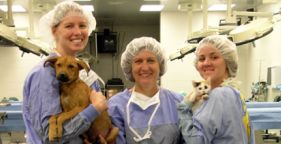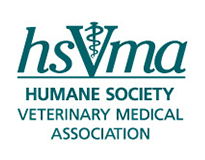New Surgery Program Saves PupJanuary 15, 2009 Henry, a deaf yet rambunctious 10-week-old Great Dane mix, recently ended up at a Florida animal control shelter after being hit by a car. Due to the extent of his injuries, which included significant fractures of both his femur and tibia, Henry was slated to be euthanized. A Second Chance Henry, a young pup that was hit by a car, now has a second chance thanks to HAARTS. HSVMA Thanks to a new program at the University of Florida College of Veterinary Medicine, Henry has been given a new lease on life and the surgery necessary to repair his fractures. Henry, and dozens of other animals in need, have received medical care through this new program called HAARTS, or Helping Alachua's Animals Requiring Treatment and Surgery, which was launched at the College of Veterinary Medicine in the fall of 2008. Countless BenefitsThe goal of the program is to expand surgical training opportunities for students, developing their skills in procedures commonly encountered in private practice in a context which does not involve medically unnecessary or terminal procedures on animals. A related goal is to partner with animal shelters and rescue groups in the community of Alachua County, treating animals in need and offering local veterinarians the option to refer low-income caregivers to the program if they are unable to afford necessary medical treatment for their companions. Surgical procedures offered through the program include fracture repair, mass removal, enucleations, aural hematoma surgeries, and hernia repair. Animals have also received minor wound care and treatment of some skin diseases. Students Take the InitiativeHAARTS was first conceived by Florida veterinary students about two years ago. Sarah Barnes and Megan Busch, both Class of 2009, took part in developing the detailed program proposal that was presented to the faculty for approval. Dr. Gwendy Reyes-Illg, a University of Florida 2008 graduate who was instrumental in initiating a willed body donation program to provide ethical-source cadavers for the school, was also a key advocate in launching the HAARTS program.  Dr. Natalie Isaza, Assistant Professor of Shelter Medicine at University of Florida (center), and two veterinary students with shelter animals. HSVMA The proposal was partially based on similar established programs at the University of California, Davis School of Veterinary Medicine and Oregon State University College of Veterinary Medicine. Both of these programs also provide necessary medical care for shelter and rescued animals in their surgical curriculum. The University of Florida students also applied for grants to help fund the program, and received a donation from the Humane Society Veterinary Medical Association (HSVMA). "This new program will provide additional and important hands-on experience for our students," wrote Dr. Colin Burrows, chair of the Small Animal Clinical Sciences at the College of Veterinary Medicine, in a letter supporting the students' request for funding. HAARTS is overseen by Dr. Natalie Isaza, Clinical Assistant Professor with the shelter medicine program, and was developed with input and guidance from Dr. Gary Ellison, chief of the Small Animal Surgery Service, and UF CVM alumna and HSVMA Leadership Council member Dr. Paula Kislak. An Invaluable OpportunitySince it was launched this fall, Dr. Isaza said the HAARTS program has had an enthusiastic response from both the students and animal rescuers in the community, who now have a means to rescue more injured and ill animals. "These cases are invaluable to the students," said Dr. Isaza, "because they are surgeries they would not likely perform at the vet schools, but they are something they need to know how to do." "This is a wonderful opportunity for me to help with Henry's fracture repair and give him a better quality of life," said Laura Eslinger, a senior veterinary student at the College of Veterinary Medicine. The good news is that after a successful surgery, Henry is now recovering and will be adopted by one of the veterinary students involved in his care. E-newsletter feature photo: Laura Eslinger, a senior veterinary student at the University of Florida College of Veterinary Medicine, is pictured with Henry. |
